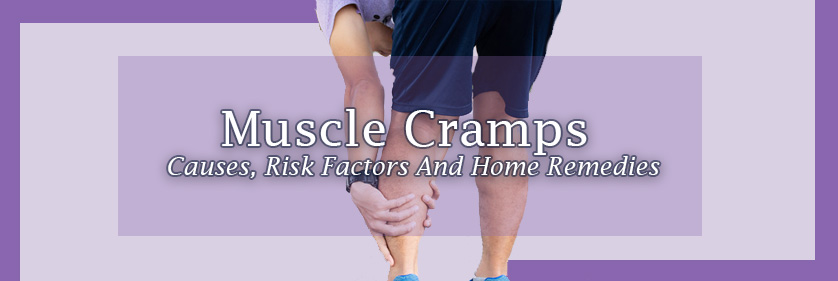Muscle cramps
Muscle cramps are unexpected or sudden, involuntary shrinkage which happens in several muscles. Such shrinkages are mostly painful and can affect various groups of muscles. A cramp’s severe pain can wake you up at night, or make walking difficult.
Those in the back of your lower leg, your thigh back, and your thigh front commonly affected muscles.
Muscle cramps can occur in everybody muscle. They occur mostly in the:
- Arms
- Abdomen (Belly)
- Hands
- Feet
- Legs
- Ribcage
Symptoms
Characteristically, a cramp is painful, often severely so. The patient generally needs to stop all activities and seek relief from the cramp; the person cannot use the affected muscle while it cramps. Serious cramps can be related to soreness and swelling, which can often continue up to several days after the cramp has subsided. The knotted muscle will bulge at the time of cramping, feel very tight and may be tender.
There are no special tests for cramps. The diagnosis of muscle cramps is however relatively easy. Most people know what cramps are and when they have one. The doctor, or any other bystander, can feel the tight, hard bulge of the compressed muscle when present during a cramp.
When to seek medical attention
People who suffer from muscle cramps should consult a doctor as soon as possible if they also have alcoholism, sudden weakness or loss of sensation, or serious symptoms or if they have lost fluids of the body (such as vomiting, diarrhoea, or excessive sweating).
Causes Muscle Cramps
Doctors do not know the exact causes of muscle cramp. When your doctor provider cannot find the exact cause, the cramps are known as idiopathic. Many different medical disorders can cause this symptom. Cause of muscle cramps may include:
- Age: Losing muscle mass will put greater pressure on your muscles over time. These adjustments will lead to more frequent cramps in your muscles as you age.
- Dehydration: Losing body fluids while exercising (especially in hot temperatures) can cause muscles to cramp.
- Hypothyroidism: Having a thyroid gland that is less active than normal can lead to muscle cramps.
- Medication: Taking some medicines, which have pseudoephedrine and statins, will cause reflex muscle cramping.
- Physical strain: Overusing your muscles while exercise or hard activities will lead to cramps.
- Pregnancy: Mostly, pregnant women experience leg cramps because of low levels of electrolyte, changes in circulation, and pressure on the nerves caused by the growing baby.
- Tight muscles: Inactivity and a lack of stretching can involuntarily cause muscles to contract (clench).
Muscle Cramps Remedies
If you are suffering from cramp, below steps can relieve your pain:
- Stretch and massage: Gently stretch the muscle which is cramp and rub it to help it relax. For a calf cramp, slowly put your weight on your cramped leg and bend your knee for the calf cramp. If you are not able to stand, sit on the floor with the cramped leg extended.
- Apply heat or cold: Use a hot towel or heat bag on tight muscles. Bath with hot water or directing the stream of a hot shower onto the cramped muscle will help. Additionally, with ice massage, the cramped muscle will relieve pain.
Risk factors
The cause of muscle cramp is not clear, but risk factors may include:
- Tight, inflexible muscles
- Poor physical condition
- Poor muscle tone
- Poor diet
- Physical overexertion
- Physical exertion of cold muscles
- Muscle injury
- Muscle fatigue
- Excessive perspiration
- Dehydration
- Reduced blood supply
- Wearing high-heeled shoes for lengthy periods.
Prevention
Preventing cramps is the best approach. The following measures can help:
- Not exercising just after eating
- Drinking lots of water after a workout (mainly sports beverages which contain potassium)
- Avoid caffeine (for example, in coffee or chocolate)
- Not smoking
- Avoid high heels
- Increase your level of physical fitness.
- Avoiding drugs

Leave a Reply
You must be logged in to post a comment.